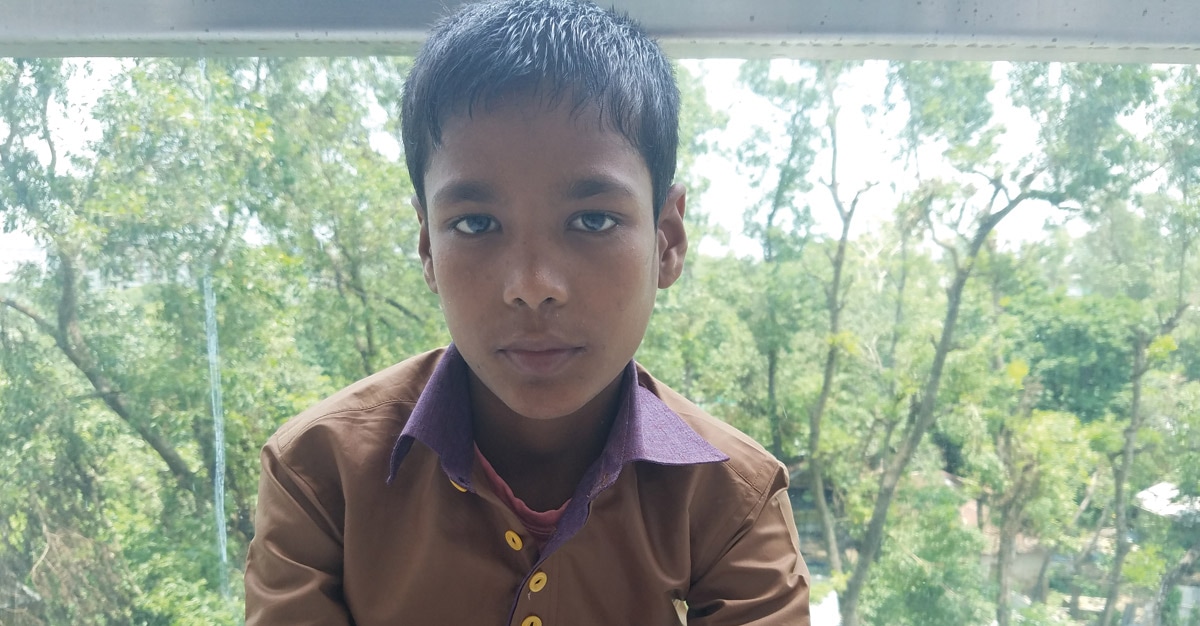|
Described by the UN as “one of the world’s most persecuted minorities”, the Rohingya people from Rakhine state, Burma have faced generations of horrific anti-Muslim violence and abuse from the Burma authorities. As a result, thousands flee over the border in the hope of finding refuge in Bangladesh.
With official UN camps in Bangladesh at capacity, arrivals since 2005 have been denied official refugee status. They are forced to settle in makeshift border camps, and any provision for unregistered refugees is prohibited by the Bangladesh authorities. On the request of the Rohingya community in one of these makeshift camps, we have provided education for 2,700 Rohingya refugee children through a low-profile approach. Ahmed is 10 years old and lives in the makeshift Kutapalong refugee camp with his parents and six brothers and sisters. He attends one of the schools run by Children on the Edge in the camp. His family are Rohingya, and faced constant persecution by the authorities in Burma. They fled to Bangladesh during a surge of violence towards their people group in 2012. His father says “We had a simple but happy life in Burma. I worked as a farmer and sometimes a fisherman. We were not rich, but we had everything we needed. Then the Rakhine mobs came to my village. They burned down my neighbour’s house. I did not wait to meet them. I took my family and ran. I have never met my neighbour again. We walked for two days to cross the border. Some mosques gave us food and water along the way. After we crossed, we walked another half day to Kutupalong camp. That first day we arrived I began building our house. I knew we had no other place to go”. Ahmed does not remember much about home, as he was just five years old when they fled, but he remembers being happy and playing with his friends in the grove of coconut trees near his house, taking turns climbing the trees. “All I really know is life in the camp. I get up at 5.00, finish my school homework and eat, go to the madrassa and then collect firewood if I can find any. Then I go to class. This is the best part of my day. I am lucky to learn, it gives me something to do each day. My favourite subject is English, but I can read and do maths, even my older brother can’t do this! If there is a newspaper I help my family understand what it says. I feel very proud to help them”. To reach the most households in the camp, Children on the Edge gives a place to one child from each household, then each student will share as much of their learning as they can with their family and friends. Ahmed’s father says “Ahmed is a smart boy and works very hard. Without education, he will just be a labourer like me. I believe he can do anything he wants if he studies hard. Without the schools, nobody in my family could read or write. I am very thankful that I have one child who can do this. Maybe they can all find a better jobs than me because they can learn. He brings his books home and shares them with his brothers and sisters, so I am hopeful he can teach the other children. Now I am too old to learn these things, but they still can learn. Also, people in the community know they can ask my son to read or write something if they need. That makes me proud”. Ahmed’s father tries to provide for the family by working as a daily labourer outside the camp. He does jobs that locals don’t want to do, but says that work is not always available and they are paid a pittance. Locals are unfriendly and he is often grabbed by the police who take any money he has earned. Ahmed never leaves the camp, and feels sorry for his friends that can’t attend the school. “They have nowhere to go, and they can’t read like me. I try to teach them, but it is not easy. If I couldn’t attend the schools I would be sad”. Ahmed feels that his future will be different because of the things he has learnt at the schools, he says “I know I can find a job because I can read, write, and do maths. And I know if I work very hard and learn many languages I can someday be a doctor in another country. Then I will take care of all my family. I love seeing my teachers, who are very smart, being with my friends and having books”. His teacher says “We hope that one day the children will replace us to teach in the community and also in the world. That they will be able to keep the name of the Rohingya known in the world. If this doesn’t happen then we will disappear. We need them to ensure the education goes down each generation.” Find out more about the project and consider supporting our work by clicking one of the buttons below. Support usComments are closed.
|
RECEIVE OUR EMAILSBlog Categories
All
Archives
July 2024
|
|
JOIN US ON SOCIAL MEDIA
|
Annual Report | Contact Us | Jobs | Media Centre | Resources | Shop
Accessibility & Policies: Accessibility | Equity, Diversity & Inclusion Policy | Complaints| Privacy Policy | Safeguarding
Accessibility & Policies: Accessibility | Equity, Diversity & Inclusion Policy | Complaints| Privacy Policy | Safeguarding
Children on the Edge, 5 The Victoria, 25 St Pancras, Chichester, West Sussex, PO19 7LT, UK | 01243 538530 | [email protected]



 Give monthly
Give monthly Fundraise for us
Fundraise for us RSS Feed
RSS Feed
